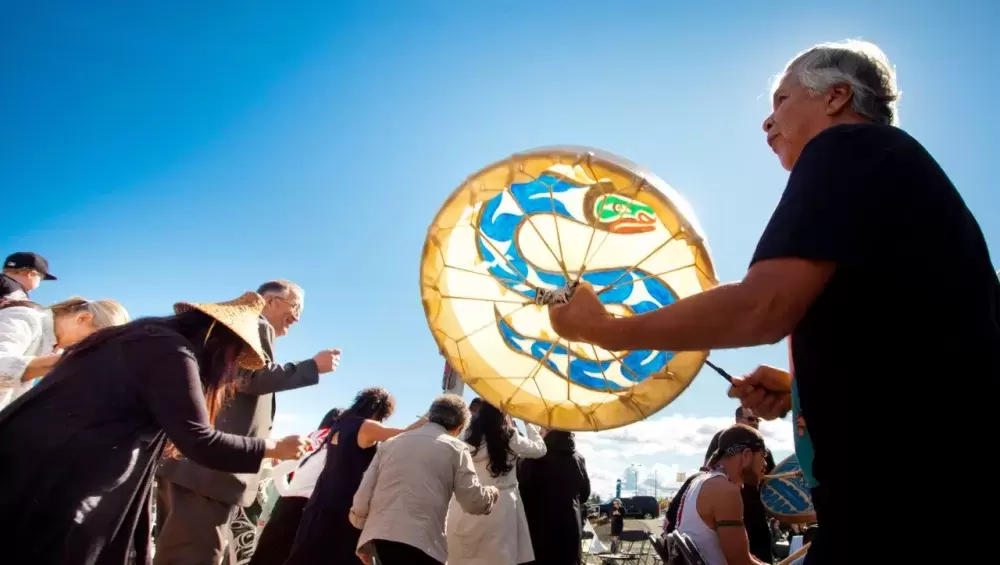A Vancouver Island University (VIU) scholarship program for Indigenous students is working toward Indigenizing and decolonizing post-secondary institutions.
The EleV Scholarship program aims to better support Indigenous learners in their post-secondary journeys and beyond by providing scholarships for youth aged 18-35, providing support services and removing barriers to education. The program is focused on providing nation-matched scholarships and culturally relevant programming and supports for Indigenous students using a co-creation approach.
Indigenous Education Navigators provide holistic, wrap-around support to Aboriginal students, including coordinating closely with their nations as well as other university and social services.
Since the program’s inception in 2017, some key insights and recommendations towards decolonization for post-secondary institutions have been raised by members of VIU’s Office of Aboriginal Education and Engagement.
In the article, Lessons for Decolonizing Post-Secondary Institutions, published on VIU’s Office of Aboriginal Education and Engagement’s blog, co-authors Heather Burke, Sharon Hobenshield and Ariane Campbell write that one of the key findings through the Elev program has been that for many Indigenous students, completing post-secondary education is a winding path rather than a straight line.
“Due to the systemic inequities caused by colonialism, trauma is more prevalent in the Indigenous student population and some are going through a healing journey alongside their learning journey,” they write.
Sharon Hobenshield, director of VIU’s Office of Aboriginal Education and Engagement, said the three main barriers that cause roadblocks for Indigenous students during their educational journey are transportation, childcare and affordable housing.
“I call them the big three,” Hobenshield said. “I think Indigenous students, many of our students, come from rural and remote locations and have families, so to find affordable housing is challenging within an urban context and there’s a lack of childcare as well.”
Hobenshield said, through the EleV Program, the Indigenous Education Navigators work closely with Indigenous students to help navigate bigger issues like child care and housing, but also daily challenges like course enrollment and registration.
“They’re making a difference,” Hobenshield said.
Another insight learned through the EleV Program is that incorporating Indigenous values into the classroom can be impactful.
“Indigenous students feel seen and heard when values such as reciprocity, whole person learning, and recognition that knowledge transcends the intellectual to the physical, spiritual and emotional realms are incorporated into the classroom,” state the authors in their blog.
Hobenshield said that when VIU became a university, an academic plan was developed and within that plan, a core objective is Indigenous commitments.
“Every program area has to speak to how it’s meeting that Indigenous commitment …it differs across the institution depending on the resources that people have, the relationships they have within the community and the discipline itself,” she said. “I think overall there’s definitely interest and commitment to working this way.”
Another recommendation stemmed from the EleV Program is for post-secondary institutions to build deep relationships with Indigenous communities for ongoing listening and co-creation.
“One of VIU’s fundamental values is working to build and maintain positive reciprocal relationships with Indigenous communities across the three language groups on Vancouver Island: the Coast Salish, Nuu-chah-nulth and Kwakwaka’wakw territories as well as the Métis Nation,” states the blog. “Co-creation with communities is essential not only for supportive programming, but also for educational content and curriculum.”
Since 2017, 181 Indigenous students have received scholarships through the EleV Program and 53 of those students have graduated.
Hobenshield said VIU works closely with the Nuu-chah-nulth Tribal Council and Nuu-chah-nulth educators to collaboratively look at educational and employment pathways for students in the K-12 system.
“Nuu-chah-nulth tells me that the majority of their students do come to VIU because of the close proximity,” Hobenshield said.
Going forward, Hobenshield and her co-workers recommend that in order to move toward Indigenization and decolonization at universities, post-secondary institutions need to hear Indigenous voices within existing governance structures and see Indigenous people in faculty positions and leadership roles on campus.
“We still need Indigenous people informing university curriculum, teaching and learning, research, policies and program development writ large if we are to see systemic change impacting students,” they write.







